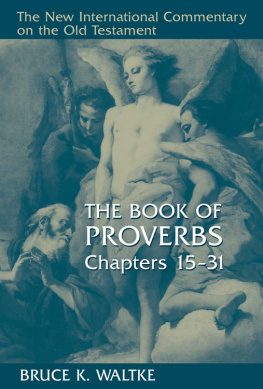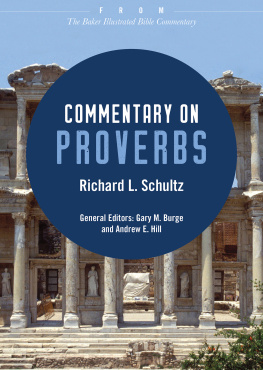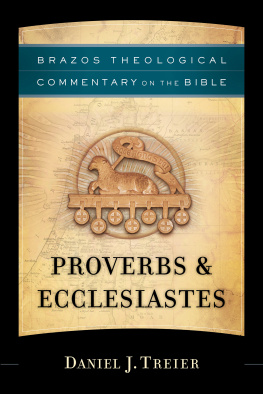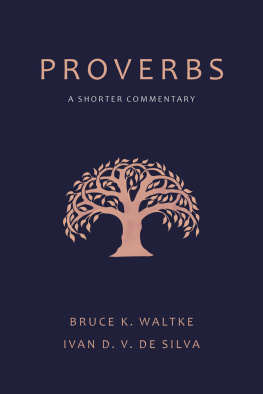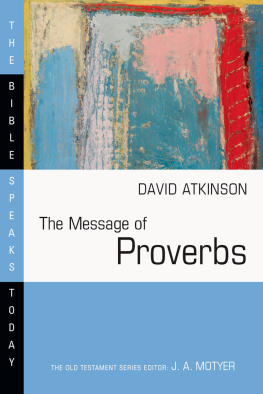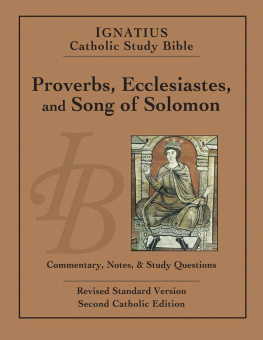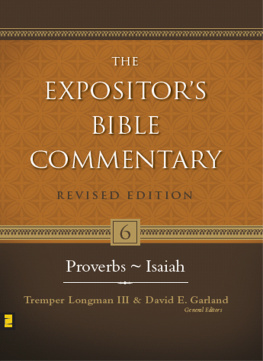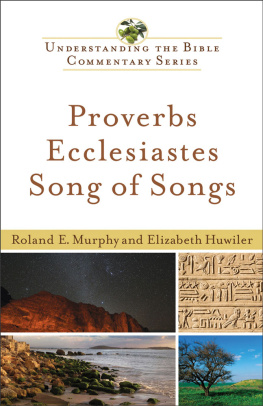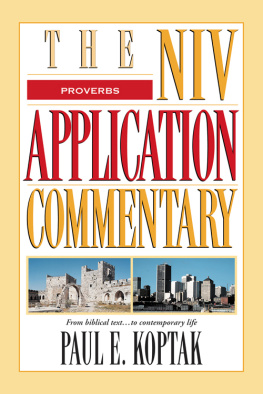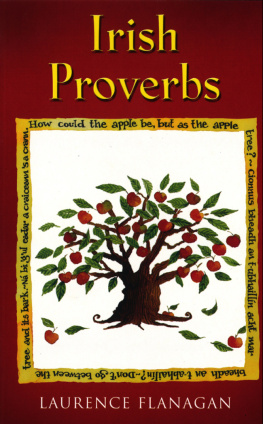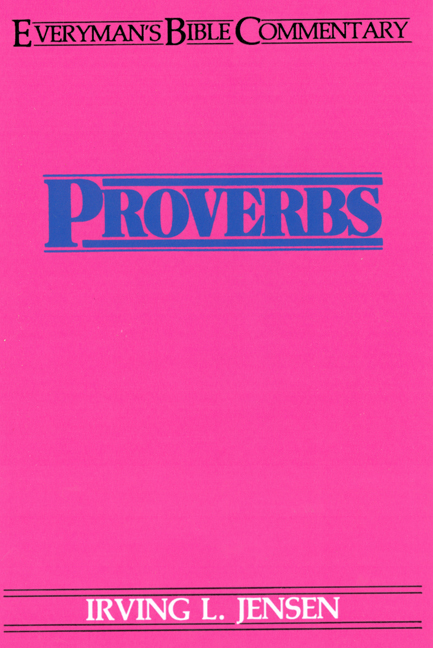PROVERBS
PROVERBS
by
IRVING L. JENSEN
MOODY PRESS
CHICAGO
1982 by
T HE M OODY B IBLE I NSTITUTE
OF C HICAGO
All rights reserved. No part of this book may be reproduced in any form without permission in writing from the publisher, except in the case of brief quotations embodied in critical articles or reviews.
Except where indicated otherwise, all Scripture quotations in this book are from the New American Standard Bible, 1960, 1962, 1963, 1968, 1971, 1972, 1973, 1975, and 1977 by The Lockman Foundation, and are used by permission.
The use of Scripture references from various versions of the Bible in this publication does not necessarily imply publisher endorsement of the versions in their entirety.
Library of Congress Cataloging in Publication Data
Jensen, Irving Lester
Proverbs.
1. Bible. O.T. ProverbsCriticism, interpretation,
etc. I. Title.
BS1465.2.J45 1982 223.706 82-14102
ISBN 0-8024-2021-4
11 12 Printing/EP/Year 93 92 91
Printed in the United States of America
CONTENTS
CHAPTER
Most Christians are acquainted with the book of Proverbs, but not many have ever read or studied its entire text. Here is a book that is as important as it is practical. It surely was intended by God to make an impact on the lives of all His children.
God knows all. That is why His Book, the Bible, should be received as true doctrine and true instruction. When a Christian reads in Proverbs about a path to be avoided, he should heed the warning and stay away from such a path. He does not have to learn the hard way by tasting the bitter fruits of sinful acts. He should learn Gods way by instruction of His Word. And when Proverbs describes a path to be trodden, that is where the believer should be walking. Such is the kind of help the book offers.
Every honest reader of Proverbs has to be impressed with how many small details of everyday conduct are the full concern of God. All the words of Proverbs are the very breathings of the Spirit of God. H. A. Ironside has described his reactions:
And this is amazing grace: to think that He who spoke worlds into being, who wrought out redemption when man had fallen, who shall eventually bring in a new heaven and a new earth, wherein dwelleth righteousness; to think, I repeat, that He, the high and lofty One that inhabiteth eternity, should stoop in grace to give instruction for the very details of His creatures lives down here, is cause for worship and admiration forever.
What an importance attaches to all that I do if the God who created me and redeemed me does not consider
Among my main purposes of writing this commentary are the following:
1. to describe the background and setting of the book as a whole, and of its individual parts.
2. to survey and examine the structure of the Bible text, which is its compositional organization. This supports the full scope of studying not only what the Bible author writes but how he writes it.
3. to comment on selected parts of the Bible text (interpretation).
4. to serve as a companion to other helps in the readers study of Proverbs.
5. to relate Proverbs to a Christocentric view of Gods revelation.
6. to inspire application of the Bible text.
It is my hope that this book will introduce the reader to many exciting and fruitful studies of this portion of Gods Word.
. H. A. Ironside, Notes on the Book of Proverbs (New York: Loizeaux, n.d.), p. 9.
1. Background and Setting of Proverbs
I. Title
II. Authorship
III. Date
VI. Purposes
V. Place in the Bible
VI. The New Testament and Proverbs
VII. Variety of Subjects
VIII. Literary Characteristics
A. Type
B. Style
1. Various Forms
2. Common Devices
3. Prominent Teaching Method
4. Length
IX. Interpreting Proverbs
X. Applying Proverbs
2.Survey of the Book of Proverbs
I. Main Divisions of the Book
II. Overall Theme
III. Outline of the Commentary
3. Who the Truly Wise Man Is (1:19:18)
I. Prologue (1:1-6)
II. The Beginning of Wisdom (1:7-33)
A. A Key Verse (1:7)
B. Gods Counsel to His Children (1:8-19)
C. Gods Invitation to the Lost (1:20-33)
1. Call to Repentance (1:20-22)
2. Sinners Rejection of God (1:23-25)
3. Recompense for Rejection (1:26-27)
4. Gods Rejection of Sinners (1:28-32)
5. Invitation Repeated (1:33)
III. Wisdom Is the Principal Thing (2:14:27)
A. Search for Wisdom and Rewards (2:1-9)
B. Wisdom as a Guide (2:10-22)
C. Need for Guarding Wisdom (3:14:27)
1. For Prosperity (3:1-10)
2. For Happiness (3:11-20)
3. For Security (3:21-26)
4. For a Testimony to Others (3:27-35)
5. For Honor (4:1-9)
6. For Lighted Paths (4:10-19)
7. For Total Consecration (4:20-27)
IV. Enticement to Sin (5:17:27)
A. Adultery: Warning and Appeal (5:1-23)
1. Warning Not to Forfeit Personal Honor (5:1-14)
a. Warning to the Reader to Listen (5:1-2, 7)
b. Description of the Adulteress (5:3-6)
c. Command (5:8)
d. Judgment for Yielding (5:9-14)
2. Appeal to Cherish Personal Honor (5:15-23)
B. Paths to Avoid (6:1-19)
1. Irresponsibility (6:1-5)
2. Laziness (6:6-11)
3. Wickedness (6:12-19)
C. Adultery: The Guilt (6:20-35) and The Lure (7:1-27)
1. The Guilt (6:20-35)
2. The Lure (7:1-27)
a. Prologue (7:1-5)
b. Drama (7:6-23)
c. Commentary (7:23b, 26-27)
d. Epilogue (7:24-27)
V. Call to Righteousness (8:19:18)
A. General Survey
B. Stanza Analysis
1. The Call of Wisdom (8:1-11)
2. Wisdom and Rewards (8:12-21)
a. True Morality (8:12-14)
b. Wise Government (8:15-16)
c. True Wealth (8:17-21)
3. Wisdom of God (8:22-31)
4. Exhortation to Listen (8:32-36)
5. Two Contrasting Invitations (9:1-18)
a. Wisdoms Feast Invitation (9:1-6)
b. Two Reactions and One Reward Principle (9:7-12)
c. Follys Feast Invitation (9:13-18)
4. How the Wise Man Should Live (10:122:16)
I. Survey of 10:122:16
II. Outlines of 10:122:16
III. Principles of Organization in the Lists of Proverbs
A. Identity
1. General
2. Specific
B. Continuity
C. Similarity
D. Unity
VI. Marks of Godly Living (10:1 15:33)
A. Things in Life That Profit (10:1-14)
1. Righteousness (10:1-3)
2. Diligence (10:4-5)
3. Integrity (10:6-10)
4. Righteous Speech (10:11-14)
B. Life at Its Best (10:15-32)
1. True Wealth (10:15-17)
2. Choice Speech (10:18-21)
3. Much Fruit (10:22-32)
C. Righteousness Works Everywhere (11:1-15)
1. In Business (11:1-4)
2. In Personal Problems (11:5-8)
3. In Government (11:9-15)
D. Sure Rewards (11:16-31)
1. For Christian Virtues (11:16-23)
2. For Liberal Giving (11:24-26)
3. For Seeking Good (11:27-31)
E. The Root of the Righteous (12:1-12)
1. Unmovable (12:1-3)
2. Upright (12:4-8)
3. Fruitful (12:9-12)
F. Escape from Trouble: Two Ways (12:13-28)
1. Prudent Lips (12:13-23)
2. Diligent Hands (12:24-27)
3. Conclusion (12:28)
G. Fruits of the Wise Mans Living (13:1-25)
H. Further Maxims of Christian Living (14:115:33)
1. Chapter 14
2. Chapter 15
V. Ways of Man That Please the Lord (16:122:16)


